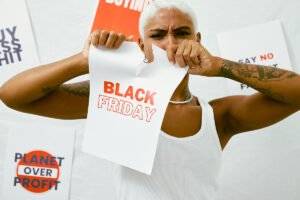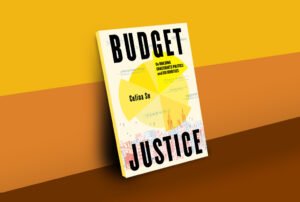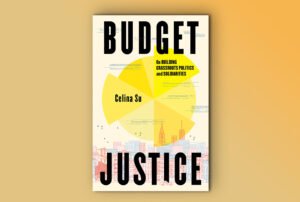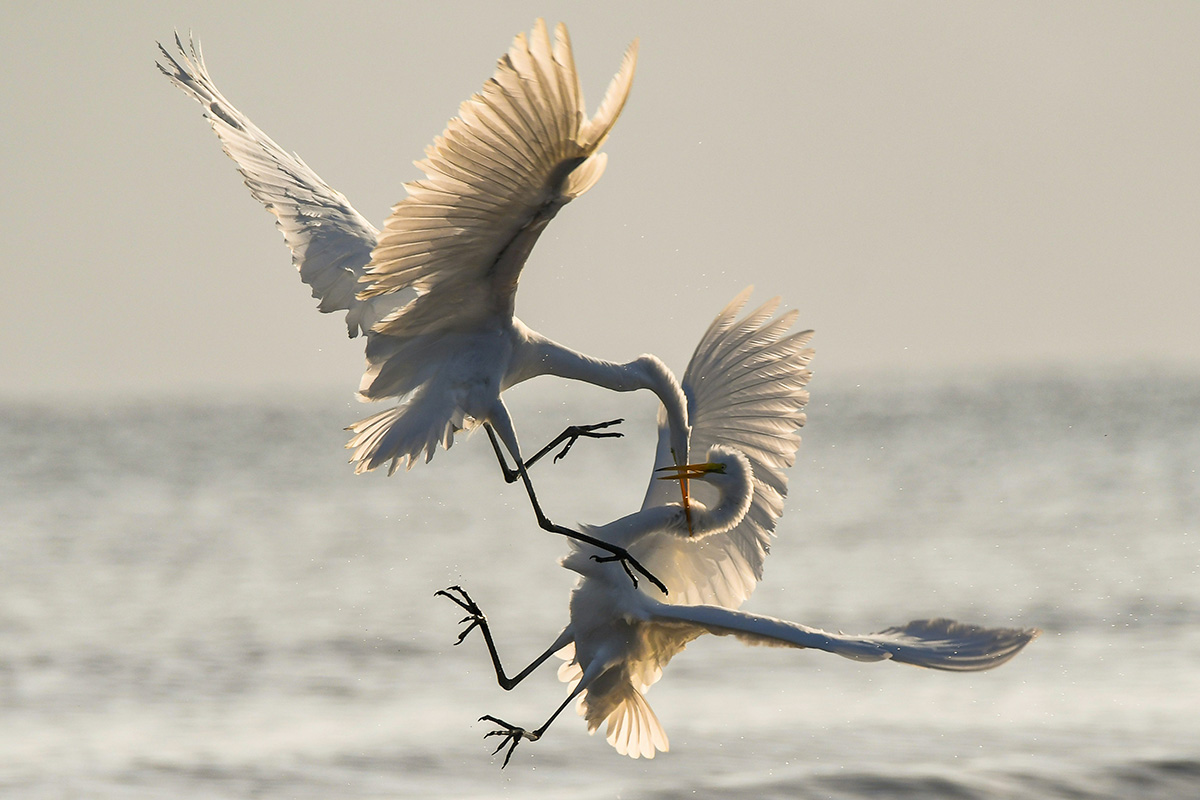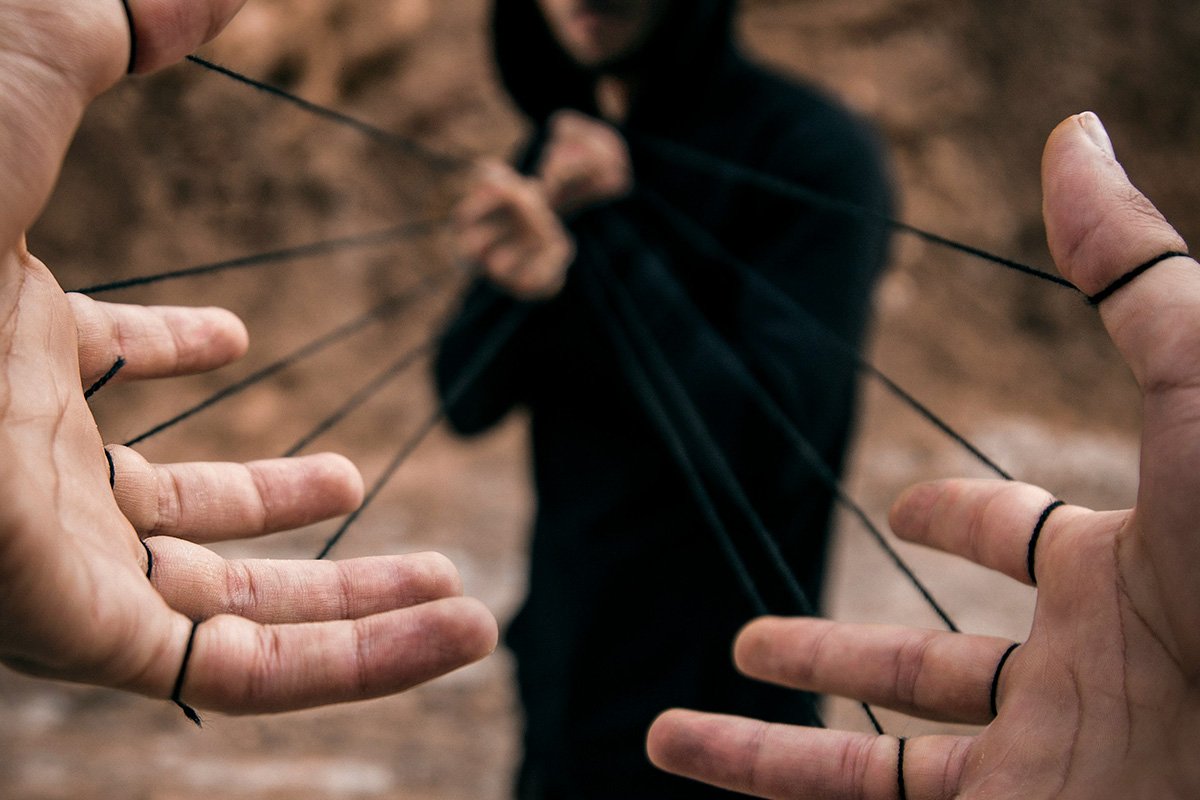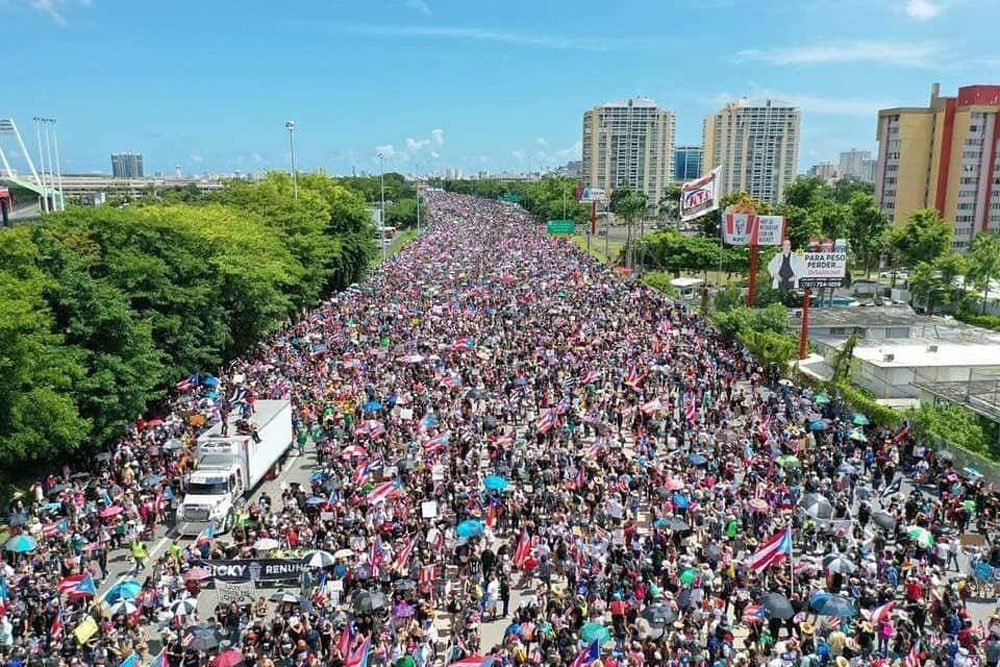
Readers are increasingly writing to me, asking one key question: How does change actually happen in a system? As we get to the edge of our current social systems— many of which are being reconsidered as the source of social oppression, discredited by the ever-more-obvious inequities and corruptions—those seeking to change them from inside, using system change thinking, are finding obstinacy as we zero in on the root of power. It should come as no surprise then that the discourses for a more equitable future are coming not from leaders in these systems, but from artists. What is happening in Puerto Rico illustrates this.
I mean “discourse” as defined by Foucault, as ways of constituting knowledge. In this sense, knowledge does not exist waiting to be discovered; it is created by our actions together. The actions of Puerto Ricans, brought into relief by its artists, are formed by the people, speak for the subordinated, the minoritized, who are actually the majority.
Aurora Santiago Ortiz writes in Medium’s Zora, “These protests were unprecedented, not only because of their size, but those who came out to demand the resignation of Rosselló came from a plurality of identities—young, old, cis, trans, queer, femme—a struggle at the intersections of everyone the governor and his squad condescended.”
The arts and culture forum Hyperallergic’s Hakim Bishara has been covering the current protests there seeking to oust the allegedly corrupt Governor Ricardo Rosselló. In a recent article, he writes, “Singers, performers, and visual artists are at the forefront of the protests on the island. The song ‘Afilando los cuchillos’ (Sharpening the Knives) by the singer iLe (Ileana Mercedes Cabra Joglar), rapper Residente (Rene Juan Perez Jolgar), and the Latin Trap artist Bad Bunny (Benito Antonio Martinez Ocasio), released before the march, has become an unofficial anthem for the protests.” (Much like Kendrick Lamar’s “Alright” became an anthem for the Black Lives Matter movement.)
NPR alt.Latino’s Feliz Contrera writes, “The song is a blistering, expletive-laden take down of Governor Ricardo Rosselló and his administration delivered with the fury and energy that is fueling the massive demonstrations that have been taking place in the capital city of San Juan in response to leaked text messages between Rosselló and others in his administration.”
Come on, we’re sharpening the knives, come on
The knife sharpener has arrived
…
The time is here, for a group of thousands on motorcycles
Patrolling 24 hours, Boricua straight from the heart
Fist raised, off to the conquest
We’re not going to be taken advantage of by an idiot from Marista (a rich private school)
…
You’re not a son of the sugar cane fields, you human waste
You are the son of the most corrupt motherfucker in history
Pardon my expressions
But just like Ricky, I’m releasing my tension
…
It’s better if you don’t try to test and see what we are made of
In El Monte, we all inherit the same courage
Your apologies drown with the rainwater in the homes that still don’t have roofs
You didn’t inherit courage, you inherited your father’s legacy
…
None of us (artists), the supposed bad guys/outlaws
Are accused of fraud, theft, or money laundering
With everything that these politicians have stolen,
We can paint the walls of the entire Caribbean
…
They persecute the projects/hood and the street dealers
They destroy their homes and no one defends them
We do the same without being delicate about it
We’ll raid these criminals in the Fortaleza (governor’s mansion)
…
We are the roar of every part of the Puerto Rican flag
Demanding that you resign so no one ends up hurt
Everyone united, the color of your political party affiliation does not matter
We dropped this song early so you can have it for breakfast
Fury is the only political party that unites us
…
Welcome the generation that says, “I won’t be pushed over.”
iLe tells Contrera, “What we are saying is what we are seeing in the streets. We are telling a story of the moment we are in right now….For me it’s very necessary that anger we have been accumulating for so long…is expressed in the song and I’m glad people are reacting to it.”
The three musicians organized quickly to release the song in time for the protests. Bad Bunny even put his European tour on hold and flew back to the island to join the protests in person.
Bishara notes, “A Puerto Rican newspaper called artists a unifying element in the protests.” The battle for human rights is happening in the realm of everyday people, at the level of discourse, and in the field of art—by creating language that imagines a better future, language that travels.
In another article, Bishara reveals that the tear gas being used against protestors in Puerto Rico are the same as those used against Palestinians in Palestine and manufactured by Safariland Group, “a company helmed by the Whitney Museum’s embattled vice chair, Warren B. Kanders.”
He continues, “Earlier today, July 20th, Hyperallergic reported that the London-based research group Forensic Architecture found new evidence that directly links Safariland to violence against protestors at the boundary between Gaza and Israel. As a result, the group withdrew from the 2019 Whitney Biennial, raising the number of artists who withdrew from the exhibition in the past few two days to eight.”
Has this ever happened before, where over a third of a population turns out for a protest? What would cause every third individual on the island to come together? It’s not something you can organize, necessarily, or it’s organized in a way that is not the usual. And the dominant is the last to realize that a shift has happened.
There are no polite systems-thinking processes in this movement. No logic maps. In some ways, this is an unexplainable phenomenon—but also inevitable. The unexpected is at work here, a liberatory thickening of relations and sense-making that spans the island and mainland US. It’s a collective will to be different, to be treated differently, to expect different. How does that happen?
I spoke Monday with Nirvana Gonzalez Rosa, a leader in the Movimiento Amplio de Mujeres de Puerto Rico (Broad Women’s Movement of Puerto Rico), a 10-year-old islandwide feminist network designed to function outside of NGOs and pursue political strategies. “Finally,” she says, “Puerto Rico is awake! The good thing about all of this, because it is a grave situation—the worst political crisis in the history of the country—is that the people have come together with a platform of demands. It has been spectacular!”
Sign up for our free newsletters
Subscribe to NPQ's newsletters to have our top stories delivered directly to your inbox.
By signing up, you agree to our privacy policy and terms of use, and to receive messages from NPQ and our partners.
Gonzalez Rosa excitedly shares the discourse that has developed over the last few days on the island between Governor Rosselló and the people. She explains that 500,000 people came out to protest in Old San Juan on July 17th. They also came out in huge numbers in Mayaguez, on the other side of the island. She says, “The whole country is burning, it is rabid, indignant.”
The chat leak was, as Gonzalez Rosa puts it, an uncovering of the pot. Suspicions of political corruption have long been held on the island, as its leaders led it into deeper crisis. It exploded with six arrests—two of government officials, including the Secretary of Education, white American Julia Keleher, who in her less than two years in Puerto Rico managed to close over 100 schools.
Besides the fact that government business regarding government money was being discussed in a private chat, a violation in itself, according to Gonzales Rosa, the almost 900-page document of the chat transcript has been read by a network of lawyers that then came together to compile a list of crimes described therein.
Almost 5,000 Puerto Ricans died after Hurricane Maria for lack of healthcare, water, electricity. Why? According to the government, because there was no money. Though by then they had allegedly already stolen millions in contracts.
Gonzalez Rosa says, “There is currently a shipping container filled with dead bodies because there is no money for pathology exams. Elias Sanchez, Governor Rosselló’s right hand man, his campaign director, alone has stolen $28 million. That’s double the budget of the office of forensics. After Maria, people buried their dead in their backyards because there were no funeral services or electricity. The islands of Vieques and Culebra are still functioning with generators. There are just lots of expressions in the exposed chats, including, ‘We fooled even our own.’”
She recounts how the idea of Monday’s general strike on Avenida las Americas (beginning at 9:00 am) to the center of San Juan (at well past 6:00 pm), and not in Old San Juan, where the protests focused last week, is in response to Governor Rosselló’s statement to last week’s protest. She says, “He said it’s the same people who are always protesting. Then he tried to discredit it by saying that people showed up because of the singers.” As if they were there to see a concert of the aforementioned singers who coined the current “informal” national anthem.
Monday’s general strike was designed to send a united and widespread message to the governor. Gonzales Rosa continues, “So, now, we coordinated the strike through networks, without NGOs, to show it is from the people, independents, the citizens. There were people there in wheelchairs!”
The idea was to go beyond 500,000 protestors to 660,510, the number of Puerto Ricans who voted for Rosselló and bigger than any previous protest. The action closed commercial enterprises along the main thoroughfare. Police and press estimates put the number of protestors at 1,250,000, twice the turnout they were aiming for.
Gonzalez Rosa reports that, starting two days ago, the island has begun the “toques de cacerola.” Every day at 8:00 pm, people beat their pots for one minute in protest. She says, “Last night, they went on for five. It is a very Latin tactic. Very famous across Latin America. It was started by women fighting military repression in Chile. Then it spread to Argentina. Today people brought pots to the strike. People beat them on their porches.”
The people of Puerto Rico can see the discourse begin to develop in their favor. Even Fox News is on their side. Fox News anchor Shep Smith began an interview with Governor Rosselló Monday with, “Representatives in Congress on both the left and the right, Democrats and Republicans, have called on you for you to resign. The largest newspaper in Puerto Rico has said it’s time for you to listen to the people and step down now…and now a million people are on the street saying, ‘Get out.’ Why won’t you?”
After Governor Rosselló’s blustering, nervous, rapid-fire response, Smith asks, “Is it even safe for you to continue to attempt to govern?…You’re a man on an island by yourself, how long can you stay there?”
As I wrap up this article, the news keeps unfolding. I get messages from people in Puerto Rico as they watch the world respond. Twitter is alive with videos of the protests that have broken out in Grand Central Station in New York City and in front of the White House in Washington DC.
Gonzalez Rosa tells me the Puerto Rican legislature has already started the impeachment process, which needs a three-fourths vote that has already been secured. She says, “This is so powerful! There is no way back. We’re going to keep going until he goes. The country is now on hold. Nobody is working. Everyone is in the streets.”
Communications expert Anat Shenker-Osorio tweeted Monday, “They can’t predict the future. We make our future together.”






